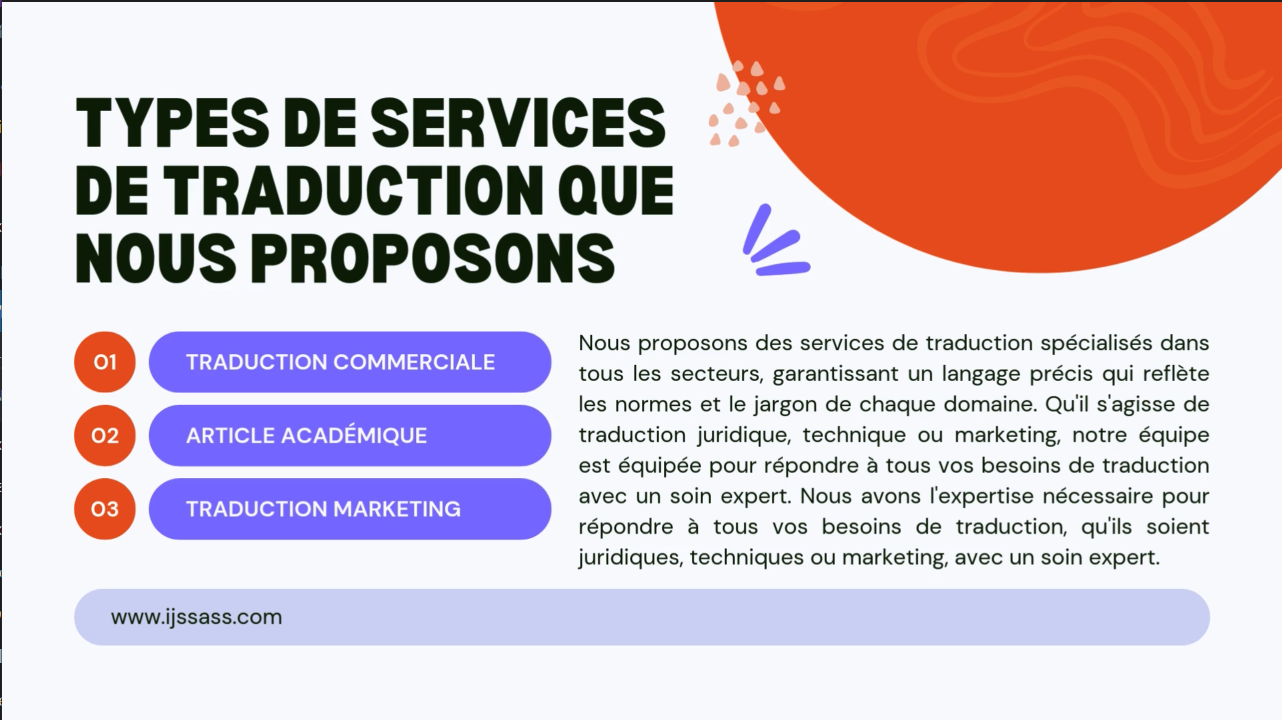Demande de papers!
The International Journal of Social Sciences and Scientific Studies (IJSSASS).
Demande de papers!
Le numéro de Janvier 2023 est en cours
www.ijssass.com
editor@ijssass.com
Read more about Demande de papers!

Pour traduire vos documents académiques, envoyez un email à ijossasseditor avec pour sujet "Traduction"
About IJSSASS
Languages: French and English
Accessibility: Open Access
Plagiarism Checker: Plagiarism X
Submit article to ijossasseditor@gmail.com
The International journal of social sciences and scientific studies (IJSSASS) is an international bi-monthly peer-review journal. IJSSASS has been at the forefront of scholarship on general education and, encouraging research and reflection on a range of disciplines in the general spectre of social sciences and sciences pertinent to Africa. Founded in 2013 under a cooperate educational consultancy firm called FETA, IJSSASS aims to serve as the forum where original research is presented and to shape the discussion of the most important and topical issues through a rigorous scholarship selection and editing process. Meeting the highest international standards, IJSSASS is published in English and French language, thus engaging in an international dialogue about education and safeguarding that its content is widely disseminated.
Coverage: Theology, Psychology, International Relations, Politics, Social Welfare, History, Public Administration, Law, Sociology, Anthropology, Information technology
Plagiarism in all its forms constitutes unethical publishing behavior and is unacceptable. The journal has no tolerance for plagiarism. All submitted manuscripts must go through cross-checking using a Plagiarism Checker.
Important Dates- ![]()
Articles Submission Open for Volume-4 Issue-1 March 2024
Last Date of Article Submission: 25 Fabruary 2024
Date of Notification: 18 March 2024
Date of Publication: 30 March 2024
The International Journal of Social Sciences and Scientific Studies (IJSSASS).
Demande de papers!
Le numéro de Janvier 2023 est en cours
www.ijssass.com
editor@ijssass.com
Read More Read more about Demande de papers!

This issue explores critical developments in education, health, and community impact within the Democratic Republic of Congo, a nation rich in resources yet facing persistent challenges in social and health sectors. We delve into pivotal topics ranging from educational advancements to pressing public health issues that affect both urban and rural communities. Each article provides insight into the unique dynamics shaping these sectors and their impact on the Congolese population.
The issue begins with a look at the Recruitment of Agents and Executives at the National School of Administration, examining how strategic recruitment can strengthen educational institutions and shape the next generation of leaders in public service. This article highlights the vital role of education in building robust public administration in a developing context.
In the field of education, we also present an Observation and Analysis of the Mastery of Essential Scientific Knowledge, specifically the “quantity of matter and mass of a body,” among first-year science students in Kananga schools. This study sheds light on how foundational knowledge in science is imparted in secondary schools, identifying gaps and offering recommendations for curriculum enhancement to improve students’ comprehension.
Transitioning to public health, the issue includes an analysis of the Impact of Community Interventions on the Prevalence of Waterborne and Fecal-Oral Diseases in the urban and rural health zones. With waterborne diseases posing significant threats to public health, this study assesses the effectiveness of community-driven health initiatives and their role in disease prevention, especially in areas with limited infrastructure.
Lastly, we explore the Impact of Household Waste on Population Health in the Matadi Health Zone, a pressing concern as unmanaged waste significantly affects environmental and human health. This article highlights the urgent need for sustainable waste management practices and policies that can mitigate health risks and create healthier living environments.
Together, these articles present a comprehensive view of the interconnected challenges and progress in education and health within the Democratic Republic of Congo. We hope this issue fosters greater understanding and inspires continued efforts to address these critical areas


ISSN: 2787-0146

This work is licensed under a Creative Commons Attribution 4.0 International License.